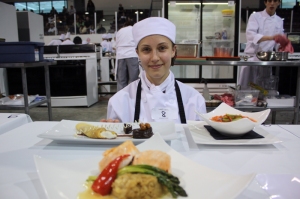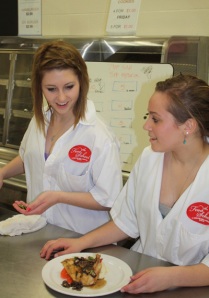Globe and Mail

Home Economics>>
AND CULINARY JUSTICE FOR ALL
It’s hard to love a recession, John Allemang writes, but bad times can be good for your diet, your health and your pocketbook
JOHN ALLEMANG
Good food has an image problem in hard times: When the economy goes bad, the pleasures of the table are seen as a luxury waiting to be skimped. Slow Food Canada held a sumptuous $150 five-course dinner in Toronto last night? How dare they! Everyone knows that these days real people are making do with Campbell’s soup, Kraft Dinner and Big Macs, eaten fast.
But if it’s a time of self-denial, of finding comfort food in meal deals, how do we explain the cooking renaissance that is going on at Centre Wellington District High School in Fergus, Ont.? Someone should remind chef-instructor Chris Jess that desperate times call for miserable menus, because otherwise he’s going to succeed in persuading his proteges exactly the opposite – that the pleasure of food is available to anyone, any time.

Katherine Bowen winning the gold for Centre Wellington at 2009 Provincial Skills Competition
And yet there they are, thronging a high-school tech course that teaches small-town students how to butcher a chicken, pickle beets, make peach sorbet from the Niagara fruit they preserved last year and turn milk into cheese.
“There’s nothing more exciting and empowering for kids,” Mr. Jess says, “than seeing milk become cheese in just a few days.”

Kimber Jolley and Danni Weber. Grade 9 student cooks.
“A number of my senior students live on their own and have the kind of problems that go with that,” Mr. Jess says.
“What I can offer them with this curriculum is independence, self-confidence and the ability to sustain their own needs. That’s not about fine dining, that’s about making tortillas and salsa from scratch.”
But there’s another lesson here, one that deserves to be heard whenever the pleasures of good food are being down-graded. Mr. Jess, as it happens, is the co-leader of Slow Food in Guelph, Ont., and he is determined to show cooking as a creative art that liberates us from the restraints of the economy’s so-called reality.
“How can it be pretentious when it’s what our grand-mothers used to do?” he asks. “We’re tapping into traditions that are rich and exciting, I’ve got 14 year-olds whose knife skills are so good, they’re talking over their family kitchens, and their parents are floored because they are so passionate about food.”
Can you make the same claims for canned soup or packaged macaroni dinners? Even if cooking from scratch does cost more, it would still supply added value in the hard times because of the joy and confidence it creates. “One of the best things Slow Food can teach North Americans,” says John Cranfield, a professor of agricultural economics at Guelph University, “is the social aspect of eating. When a family sits down to eat in a time of stress, there’s a silver lining in the dark clouds.”
But it’s also work remembering Slow Food is rooted in what Italians proudly call la cucina povera – poor person’s food. Whatever the ticket cost for the gala dinners, or the sticker shock that can accompany the local, organic and fair-trade ingredients prized by the movement’s adherents, there remains a model of gastronomic thrift that is perfectly suited to these times – if only we’re receptive to it.
“Someone who’s economically challenged has as much right to pleasure as the well-off,” says Mara Jernigan, a Slow Food proponent and chef based at Fairburn Farm in the Cowichan Valley of Vancouver Island. “And pleasure is part of our ammunition: It’s one of the tools we can use to entice people into rediscovering good local food.”
Scorning the elitist tag, Ms Jernigan talks about walking out her back door, gathering some stinging nettles, making a rough pasta out of flour and water and producing “an incredible meal which only costs pennies.” But, of course, it’s not just the cost that is at issue among people who question which foods best suit a time of cutbacks and downsizing – it’s the very idea that poorer people would choose to eat stinging nettles, would have access to them, would know what to do with them if they found them and would be able to supply the splash of rustic Sicilian olive oil that elevates la cucina povera into the food of the gods.
These are the kinds of cultural and economic conundrums that can sideline any conversation about the relationship between poverty and pleasure. But while the critics of Slow Food, founded in 1986 by Italian journalist Carlo Petrini, and similar food-liberation movements belabour the point, the truly altruistic and empathetic eaters have long since moved on. For cookbook author Anita Stewart, straightened times can be advantageous in the local food world.
“Farmers markets are thriving, and we’re in the wonderful situation where we don’t have enough farmers for our markets. Now, we can finally tell people who want to farm: ‘Go back to the land and you can make money.’”
Gabriel Riel-Salvatore of Slow-Food Montreal talks excitedly about the growth of the movement in rural Quebec – a Salon du Gout, or food festival, held in Marieville, in the apple-rich Monteregie region east of the city, “has become a tool to help the economy and helped people start to discover our local goods.”
“Food is at the heart of the creative economy,” says Harriet Friedman, a sociologist at the Munk Centre for International Studies and co-chair of the Toronto Food Policy Council. “It offers huge possibilities for economic revitalization, and could be the same motor for growth that the car industry was 30 or 40 years ago.”
That kind of long-term thinking doesn’t put good food on the impoverished table tonight, of course, and it does involve some inbuilt contradictions – what Prof. Friedmann, who is